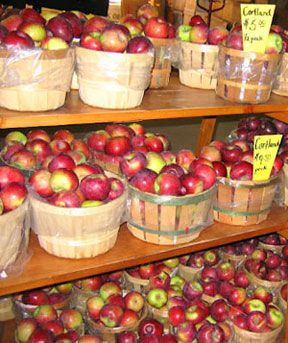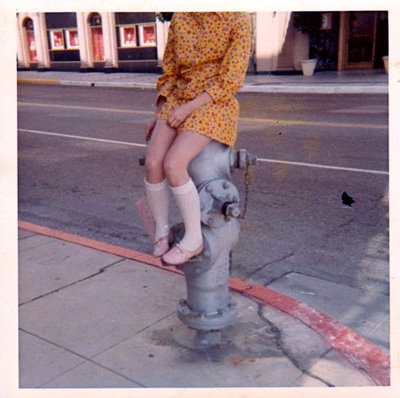 I miss apple-picking in New England. Overall the produce found in Southern California is superior to anywhere we have lived, but just like football, when it comes to apples, you simply can't beat New England.
I miss apple-picking in New England. Overall the produce found in Southern California is superior to anywhere we have lived, but just like football, when it comes to apples, you simply can't beat New England.
New England has scores of picturesque orchards with rolling hills and countless trees. There are few pleasures in life as satisfying as biting into a just picked Macoun apple while standing in the warm sun on a chilly fall New England day.
The first autumn that Jeff and I lived in North Carolina, we planned our annual apple-picking day. When we arrived ready to pick, we were aghast that our treasured McIntosh, Macouns, and Cortlands were nowhere to be found. Instead we had to make due with Red Romes, Galas, and Arkansas Blacks (a hard, tart apple which became my new favorite).
Just as we got used to our apples in the Southeast, we then moved to California and had to learn an entirely new set of apples. Though crunchy, sweet Fujis are probably the most popular apple here, my local favorite is the Pink Lady.
Unlike her name, she's quite sassy, just right for an eating apple. Then there's the Winesap, which according to Riley's Farm of Oak Glen, CA, is the "Celebrity Rock Star of Apples." No wonder. It's deep crimson red, super firm and crispy, and assertively tart. Definitely not an apple for the timid.

 Even in turbulent time like these there are certain constants in life – like noodles. Noodles have played a very important role in my life. Whenever I got sick my mother would cook luchen (‘luxshun’ for those jews and non-jews unfamiliar with yiddish pronunciation) and cheese. I have vivid recollections of her bringing me a steaming bowl (not just a bowl but a BOWL) of wide egg noodles (like pappardelle but eggier and chewier) bathed in butter, cottage cheese, cream cheese, cinnamon and a touch of sugar and salt. It was the only thing I had to look forward to when I got sick. If the noodles were hot enough, the sugar and butter would melt into a glaze over the whole dish. And in college when I got sick I would routinely make myself a bastardized version of the dish usually with just spaghetti, salt, butter and cottage cheese. As I got older and began moving around the country for different jobs the luchen and cheese unfortunately receded into my history.
Even in turbulent time like these there are certain constants in life – like noodles. Noodles have played a very important role in my life. Whenever I got sick my mother would cook luchen (‘luxshun’ for those jews and non-jews unfamiliar with yiddish pronunciation) and cheese. I have vivid recollections of her bringing me a steaming bowl (not just a bowl but a BOWL) of wide egg noodles (like pappardelle but eggier and chewier) bathed in butter, cottage cheese, cream cheese, cinnamon and a touch of sugar and salt. It was the only thing I had to look forward to when I got sick. If the noodles were hot enough, the sugar and butter would melt into a glaze over the whole dish. And in college when I got sick I would routinely make myself a bastardized version of the dish usually with just spaghetti, salt, butter and cottage cheese. As I got older and began moving around the country for different jobs the luchen and cheese unfortunately receded into my history.  The thing I remember most about baking oatmeal cookies when I was 8 years old was that the bottoms always burned. Even if you faithfully followed the recipe on the back of the Quaker Oats box to a tee, which I absolutely did, when you pulled the sheet out of the oven, slid your spatula under that first lightly browned mound and peered hopefully at its underside, all you got was burned.
The thing I remember most about baking oatmeal cookies when I was 8 years old was that the bottoms always burned. Even if you faithfully followed the recipe on the back of the Quaker Oats box to a tee, which I absolutely did, when you pulled the sheet out of the oven, slid your spatula under that first lightly browned mound and peered hopefully at its underside, all you got was burned. In the chill air at 7:30 in the morning, I would head out. Heavy books that I never opened were piled high in my arms. They weighed me down, but I was used to it. These were pre-backpack years. Teachers required you to cover books then, and mine wore clumsy jackets of recycled brown Safeway grocery store bags. The covers barely hung on, despite the many pieces of Scotch tape randomly applied in all directions.
In the chill air at 7:30 in the morning, I would head out. Heavy books that I never opened were piled high in my arms. They weighed me down, but I was used to it. These were pre-backpack years. Teachers required you to cover books then, and mine wore clumsy jackets of recycled brown Safeway grocery store bags. The covers barely hung on, despite the many pieces of Scotch tape randomly applied in all directions. As a little girl, I loved to swim, still do. Just about any chance I got to go swimming, I would. I dreamed of having my own pool. My bigger dreams were to be an Olympic swimmer and also to swim the English Channel.
As a little girl, I loved to swim, still do. Just about any chance I got to go swimming, I would. I dreamed of having my own pool. My bigger dreams were to be an Olympic swimmer and also to swim the English Channel.
